During the epidemic period, the rent was raised again. Xiao Luo, a free guest in Shanghai who was originally scheduled to retire on May 3, had to renew his lease because he could not move in time due to the closure of the epidemic. But after he asked about the renewal of the housekeeper, he was shocked by the amount of renewal. Xiao Luo's original rent was 3890 yuan per month. The housekeeper freely told him that the price for renewal in January was 4790 yuan, and the price for renewal for half a year was 4400 yuan / month. The house cannot be rented for a long time again. This made Ronaldinho feel bad. After the long-term lease was replaced by the short-term renewal, excluding the service fee, the rent renewal increased by 23% and 13% in January and half a year.
Such a high increase made him feel the pressure and helplessness of renewal. Ronaldinho soon found that there were many free customers like him who suffered a sharp rise in rent due to the epidemic.
Increase by 31%, you can only be forced to renew the lease
Due to repeated epidemics, many places across the country have implemented strict prevention and control measures again since this year. Among them, Shanghai entered the strict control period from April until June, when it began to gradually return to work and production, while Beijing implemented the measures of comprehensively suspending food in the hall and implementing home office in May.
Under such circumstances, the free guests who cannot move are faced with the situation of "one of two choices": they are either forced to accept the increase in long-term rent, or pay a high premium for short-term renewal, or pay high liquidated damages.
"We can't get out of the door. How can we move it?" When it comes to renewal, Xiaolin, a free guest in Huangpu District, Shanghai, has a deep sense of helplessness.
On April 18 last year, Xiaolin signed a one-year rental contract through Zhili. The contract expired on April 19, 2022, and the rent was 3490 yuan / month. Due to the epidemic situation in Shanghai, it was impossible to check out and move. Xiaolin wanted to extend the lease for one month, but when she renewed the lease, she found that the rent had risen to 4580 yuan / month.
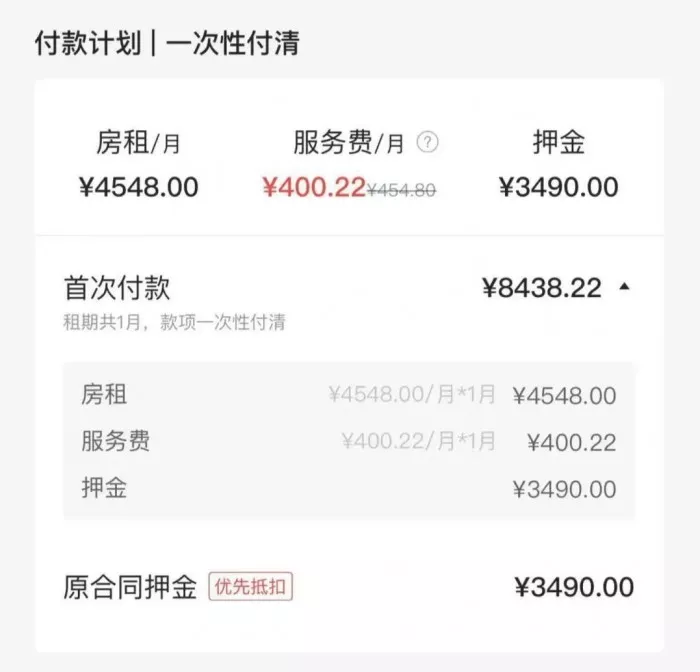
In January, Xiaolin's rent increased by 31%
Xiaolin told the housekeeper freely that the rent increase was too high and unreasonable, but the housekeeper said that the long-term rent would generally increase by 15%. If he could not accept it, he would rent it for a year at 3640/ month, otherwise he would pay liquidated damages. "The housekeeper said that the short-term increase was 15%, the actual increase was 31%, and the long-term rent also increased by 150 yuan. Before the service fee is calculated, this is not taking advantage of the epidemic situation to rob."
Li Ran, a free guest at Songjiang Pavilion, encountered the same problem of rent increase. The second bedroom rented by Li Ran was originally 2630 yuan / month. Because of the epidemic, the price rose to 2760 yuan at the end of March and 2890 yuan when the contract was renewed in April. She originally thought that the epidemic situation in Shanghai would ease in May, so she withdrew the rent, but after withdrawing the rent, she found that the rent had risen to 3030 yuan / month.
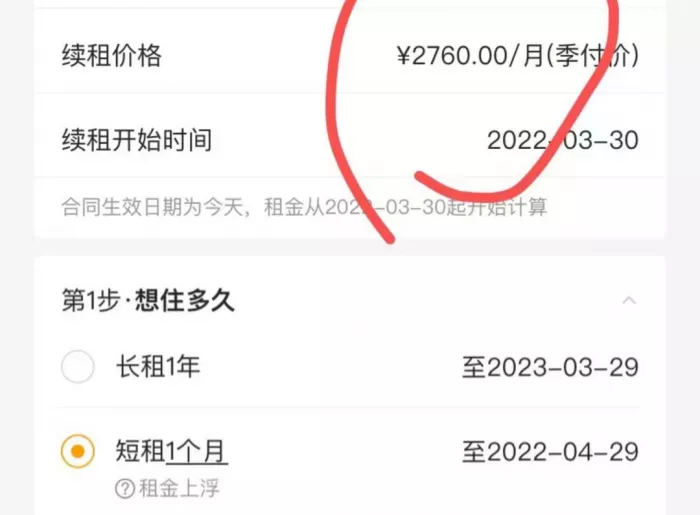
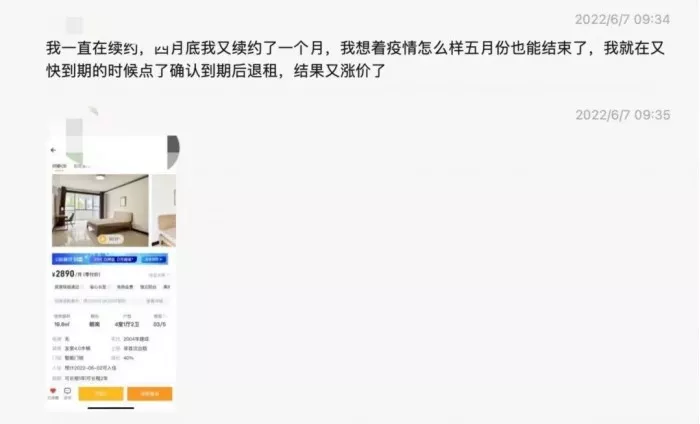
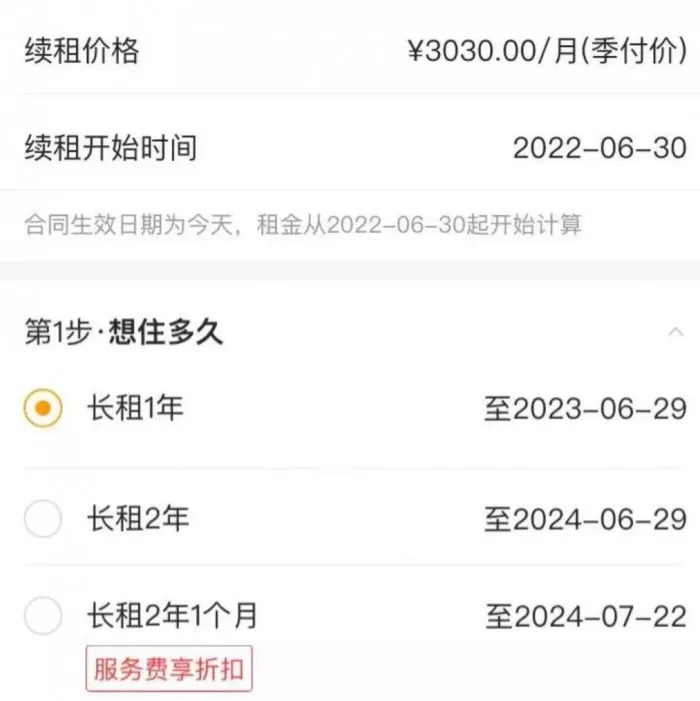
Shanghai free Li Ran's free price renewal
Li Ran said that he has rented a house freely since 2020. The initial rent was 2490 yuan / month, which basically increased by about 100 yuan every year. Unexpectedly, it increased in January during the epidemic period.
Since he could not move, Li Ran hoped to sign again at the original price of 2630, but received a reply that "he would move without signing, and would change the password lock if he could not move". Li Ran, who was so angry that he "set a clear price and bullied people", complained and negotiated with the free platform for many times, and finally failed to get a satisfactory solution.
Not only in Shanghai, but also in Beijing. Chen Lin, an employee of the Internet company, made a lot of bitterness. He rented a whole one bedroom in Dawang Road, Beijing. The contract expired in June. Due to the epidemic, it was inconvenient to see the house at home. He could only renew the lease for another year. As a result, he was notified that the rent was increased by 200 yuan. "This is not the first time they have raised the price. Last year, the rent renewal increased by 70 yuan. This year, it has increased too much."
In this case, phoenix.com technology contacted housekeeper Yang, who was responsible for the area near Dawang road. Housekeeper Yang said that the pricing is automatically calculated by the system. After signing the contract with the landlord, the annual fee paid to the landlord will rise by 3% every year.
Take advantage of the epidemic to "start from the ground" and "eat both ends"
"Taking advantage of the epidemic situation to increase the rent", freely therefore embarked on the hot search.
Under the topic of microblog, a number of tenants from Beijing, Shanghai, Hangzhou, Shenzhen and other places reported that they freely took advantage of the epidemic to move and change rent, and wantonly raised rent. The renewal of rent generally increased by 10%-30%.
In addition, the free service fee mechanism was also prosecuted. During the epidemic in Shanghai, Zifang was unable to provide maintenance and cleaning services, but still charged high service fees, resulting in many tenants' complaints. "We didn't do any cleaning in April and may. In the middle, our kitchen was still leaking, and we charged a service fee.". "It was agreed that 40% of the service fee would be returned, but only 10% was returned. The service fee increased by 42% with the rent."
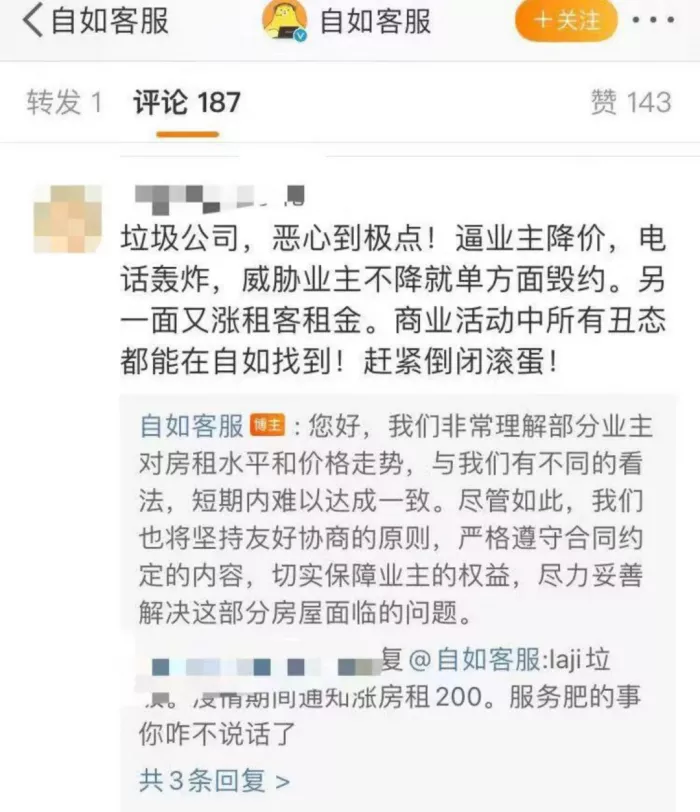
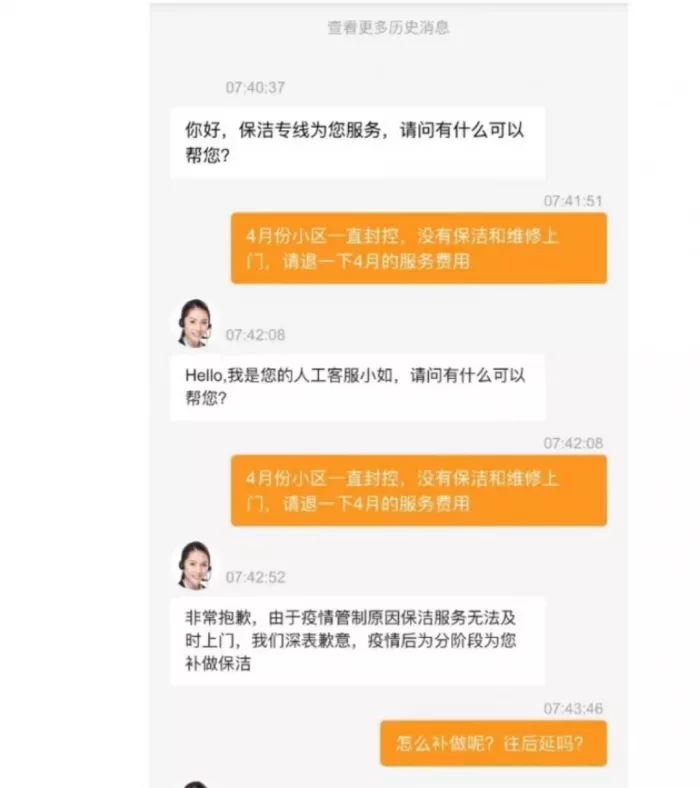
Tenants' complaints about freedom
With the further fermentation of the event, freewill had to respond, saying that the main reason may be the agreement that the rent in most of the owners' entrustment agreements increases by a certain extent year by year, and that the rent of individual houses may indeed increase by more than the average level due to factors such as the owners're signing the contract, the tenants' participation in preferential activities in the early stage, and the significant increase in the surrounding rent due to market supply and demand, which makes the tenants feel more strongly about the increase.
For this response, netizens did not buy it, and questioned the "two ends take all" freely.
Ms. Xu, the owner of Wangjing New Town in Beijing, told fenghuang.com that since the outbreak of the disease, she had called her many times to say that the market was bad and hoped that she could reduce the rent. In November last year, the housekeeper asked her to reduce her rent by 3% on the grounds of the rental market and the company's losses; In May this year, she also said that the impact of the epidemic was too great, and hoped that she would reduce the house price by 500 yuan.
"They eat two fish a day. It's good to say that we raised the rent?" Ms. Xu is indignant.
Qian Datong, a leasing practitioner, also disagrees with the idea of freedom. He told fenghuang.com that the "tenant preference" freely claimed is actually to reduce inventory and vacancy rate, because if the market is bad, the house will have to pay if it is empty. On the other hand, the rental market in Beijing was sluggish in May, so it is not feasible to say that the rent was affected by the increase of market supply and demand.
According to the data of Shell Research Institute, the rent level of 40 key cities in China fell slightly month on month in May. Nearly 70% of the cities' rents fell year on year, with the rent level of 34.0 yuan / square meter. The rent index fell slightly by 0.7% month on month and 2.3% year on year. From the perspective of city level rent index, the rent of first tier cities Beijing, Guangzhou and Shenzhen is lower than that of the same period in 2019. Among them, the lease turnover in Beijing in May decreased by more than 20% month on month, and the lease turnover in all districts decreased by more than 10% month on month.
Qian Datong said that in the case of small trading volume, leasing companies should drive business by volume and generally reduce prices. For example, it is good to rent a house in the off-season at the end of the year. "Freely saw that the epidemic situation in Beijing had been preliminarily controlled, raised prices with a dominant market position, and attributed the company's behavior to objective factors."
Phoenix technology learned that local governments have also introduced relevant regulatory measures for the price adjustment of long-term rental apartments. In May this year, the Beijing housing lease regulations, which lasted eight years, was officially launched, which clearly stated that "the annual increase of urban housing rent shall not exceed 5%". However, this regulation was officially implemented on September 1, and is still in a gap period of promulgation but not implementation, which also exempted the free price increase from punishment.
The performance pressure is transferred to the tenant, and the free mode is questioned
As a leading enterprise of long-term rental apartments, it is not the first time that freedom has been exposed to wanton price increases.
When the outbreak of the epidemic broke out in early 2020, a number of free customers complained that free began to charge during the epidemic period, the actual increase in rent was far beyond the scope previously promised, and the renewal rent generally increased by about 15%. Finally, Xiong Lin, CEO of Zhili, calmed down the storm by saying that "if there is any empirical evidence, he and all the management team will resign immediately while the epidemic rises".
Now, freely once again staged a price rise while taking advantage of the epidemic, and Xiong Lin was "beaten in the face".
After repeated price increases, the free model has also been questioned. Is it because the enterprise is under too much pressure, so the cost is transferred to the increase of rent?
Mainly distributed apartments. That is, rent the houses from the owners, and then simply design and decorate them, complete the household appliances and furniture, and then sublet them as the "second landlord" to collect the rent. At the same time, provide housekeepers, maintenance, cleaning and other items to earn service fees. At present, the company has been distributed in 10 cities nationwide, serving nearly 500000 owners and 5million customers, and its scale has become the industry leader.
However, the profit of this redecoration model is meager, and the rent of tenants needs to be continuously invested in new houses. Once the cash flow is paralyzed, the enterprise will suffer a fatal blow.
Previously, there were problems with eggshells, young people and other well-known long-term rental apartments. Because the capital chain was broken, the landlords could not get money, so they drove the tenants away. Superimposed on the prevailing rent loans at that time, many people had to repay the loans without housing.
Under the influence of the epidemic, the rental market has been depressed in recent years, and the rental rate of long-term rental apartments has decreased significantly, which undoubtedly makes things worse for the free people. According to the disclosed data, from 2019 to 2021, the free revenue was 309million yuan, 128million yuan and 158million yuan respectively. Although it increased by 23% in 2021, it was only half of the level before the outbreak. According to the first consumer finance data, in 2015, 2016 and 2017, the company suffered a cumulative loss of nearly 1.3 billion yuan.
Before the epidemic, there was a high loss and high turnover. Now, the income affected by the epidemic has been greatly reduced, and the pressure of freedom is not small.
Whether it is a choice for enterprises to reduce costs to freely "raise rents" for tenants and "reduce housing fees" for landlords is inconclusive for the time being. However, in the special period of the epidemic, how to balance the interests of tenants, landlords and enterprises has become a difficult operation problem.
(at the request of the interviewer, Xiao Lin, Chen Lin, Li Ran and Qian Datong are pseudonyms.)